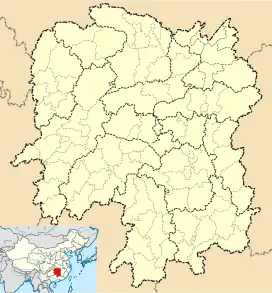Wutuan
Wutuan (Chinese: 五团镇; pinyin: Wǔtuán Zhèn) is a rural town in Chengbu Miao Autonomous County, Hunan, China. As of the 2015 census it had a population of 13,476 and an area of 173-square-kilometre (67 sq mi).[1] The town shares a border with Pingdeng Town to the west, Dingping Township to the east, Baimaoping Township to the north, and Weijiang Township to the south. It is a major border trade town, because its north and west sides are Guangxi Zhuang Autonomous Region.[2]
Wutuan Town
五团镇 | |||||||
|---|---|---|---|---|---|---|---|
 Wutuan Town Location in Hunan | |||||||
| Coordinates: 26°03′33″N 110°09′49″E | |||||||
| Country | China | ||||||
| Province | Hunan | ||||||
| Prefecture | Shaoyang | ||||||
| Autonomous county | Chengbu Miao Autonomous County | ||||||
| Area | |||||||
| • Total | 173 km2 (67 sq mi) | ||||||
| Population (2015) | |||||||
| • Total | 13,476 | ||||||
| • Density | 78/km2 (200/sq mi) | ||||||
| Time zone | UTC+08:00 (China Standard) | ||||||
| Postal code | 422510 | ||||||
| Area code | 0739 | ||||||
| Chinese name | |||||||
| Traditional Chinese | 五團鎮 | ||||||
| Simplified Chinese | 五团镇 | ||||||
| |||||||
Name
"Wutuan" means five trionychidaes. The name of "Wutuan" derives from five sandbars in the river, which are similar to "trionychidaes", the pronunciation of "trionychidae" in local dialect is "Tuanyu" (Chinese: 团鱼).[3]
History
During the Ming dynasty (1368–1644), it belonged to Moyidong (Chinese: 莫宜峒). In the following Qing dynasty (1644–1911), it came under the jurisdiction of Xiamoyidong (Chinese: 下莫宜峒). In the Republic of China (1912-1949), it was a part of Xianyi Township (Chinese: 咸宜乡). In 1934, the First Front Army of the Chinese Workers' and Peasants' Red Army passed here during the Long March.
After the establishment of the Communist State in 1950, its land belongs to the three townships of Jinshui (Chinese: 金水乡), Jinnan (Chinese: 金南乡) and Wutuan (Chinese: 五团乡). In 1958, the three townships were merged and renamed "Xianyi People's Commune". In 1961 it was split into two communes, namely Jinnan People's Commune and Wutuan People's Commune. In 1984, the two were renamed Jiangtousi Township (Chinese: 江头司乡) and Wutuan Township respectively. In 1995, the Jiangtousi Township was merged into Wutuan Township. In the next year, it was upgraded to a town. On December 31, 2015, the former Nanshan Town (Chinese: 江南山镇) was demerged, some areas were merged into Wutuan Town.
Administrative division
As of 2015, the town is divided into 15 villages: Dushu (Chinese: 独树村), Jindong (Chinese: 金东村), Shikong (Chinese: 石空村), Baishuitou (Chinese: 白水头村), Lali (Chinese: 蜡里村), Mugua (Chinese: 木瓜村), Xuntou (Chinese: 巡头村), Pingshan (Chinese: 坪山村), Jiangtousi (Chinese: 江头司村), Mudong (Chinese: 木懂村), Tengping (Chinese: 藤坪村), Chushui (Chinese: 初水村), Chayuan (Chinese: 茶元村), Hengzhou (Chinese: 恒州村), Pulushui (Chinese: 铺路水村), and 2 communities: the 1st Community (Chinese: 第一居委会) and 2nd Community (Chinese: 第二居委会).
Geography
The town is located in the southwest of Chengbu Miao Autonomous County. It has a total area of 173 square kilometres (67 sq mi), of which 143 square kilometres (55 sq mi) is land and 9 square kilometres (3.5 sq mi) is water.[3]
The Furong River (Chinese: 芙蓉河) flows through the town south to north.[4]
Demographics
The National Bureau of Statistics of the People's Republic of China estimates the town's population was 13,476 on December 31, 2015. Miao people is the dominant ethnic group in the town, accounting for 68.57% of the total population. There are also nine ethnic groups, including Dong people, Yao people, Zhuang people and Tujia people. Among them, Han is 1,700, accounting for 13.39%, Dong, Yao, Zhuang and Tujia are 2,400, accounting for 18.90%.[3]
Economy
The town's economy is based on nearby mineral resources and agricultural resources. Underground mineral resources include diabase, tungsten, silicon and lead. Agricultural products include rice, pepper, tomato, pear, tea, cattle, goat, medicinal materials, etc. Among them, pear, tea seed oil, pepper, tofu and fish are famous local products in the town.
Transportation
The County Road X093 passes across the town.
References
- Huang Yanping; Chen Yanxia (2015-12-31). 城步举行长安营镇授牌仪式. hn.rednet.cn (in Chinese).
现在,长安营镇辖15个建制村,3个社区居民委员会,总面积260平方公里,总人口8013人,镇人民政府驻岩寨村。五团镇辖15个建制村,2个社区居民委员会,总人口13476人,区域面积173平方公里,镇人民政府驻中山居民委员会。
- Wu Yizhen, ed. (2009). 《城步苗族自治县概况》 [General Situation of Chengbu Miao Autonomous County] (in Chinese). Beijing: Nationalities Publishing House. p. 234. ISBN 978-7-105-08659-7.
- 城步苗族自治县行政区划 [Administrative divisions of Chengbu Miao Autonomous County]. chengbu.gov.cn (in Chinese). 2017.
- Zhang Hong, ed. (2018). "Chengbu Miao Autonomous County" 《城步苗族自治县》. 《中国分省系列地图册:湖南》 [Maps of Provinces in China: Hunan] (in Chinese). Xicheng District, Beijing: SinoMaps Press. p. 80. ISBN 978-7-5031-8949-4.